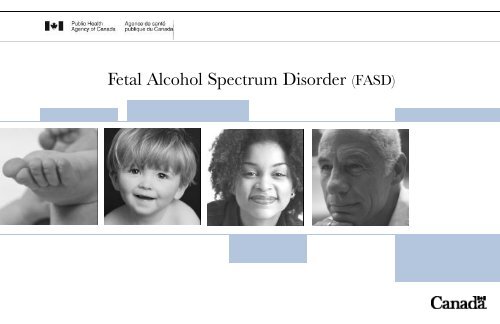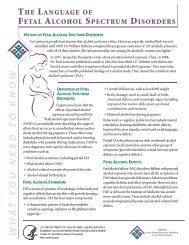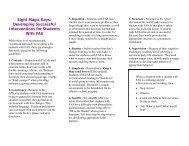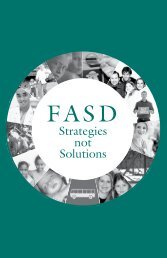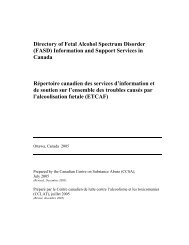Fetal Alcohol Spectrum Disorder (FASD)
Fetal Alcohol Spectrum Disorder (FASD)
Fetal Alcohol Spectrum Disorder (FASD)
Create successful ePaper yourself
Turn your PDF publications into a flip-book with our unique Google optimized e-Paper software.
<strong>Fetal</strong> <strong>Alcohol</strong> <strong>Spectrum</strong> <strong>Disorder</strong> (<strong>FASD</strong>)
What is <strong>Fetal</strong> <strong>Alcohol</strong> <strong>Spectrum</strong> <strong>Disorder</strong><br />
(<strong>FASD</strong>) <br />
There's a lot to know about <strong>Fetal</strong> <strong>Alcohol</strong> <strong>Spectrum</strong><br />
<strong>Disorder</strong>, or <strong>FASD</strong>. Here are answers to some of<br />
the questions often asked about <strong>FASD</strong>. <strong>Fetal</strong> <strong>Alcohol</strong><br />
<strong>Spectrum</strong> <strong>Disorder</strong> (<strong>FASD</strong> ) is a term that describes<br />
a range of disabilities that may affect people whose<br />
mothers drank alcohol while they were pregnant.<br />
The diagnoses of <strong>FASD</strong> are:<br />
∴ <strong>Fetal</strong> <strong>Alcohol</strong> Syndrome (FAS)<br />
∴ partial <strong>Fetal</strong> <strong>Alcohol</strong> Syndrome (pFAS)<br />
∴ alcohol-related neurodevelopmental<br />
disorder (ARND), and<br />
∴ alcohol-related birth defects (ARBD)
How do you get <strong>FASD</strong><br />
The only way someone can get <strong>FASD</strong> is if their<br />
mother drank alcohol when she was pregnant.<br />
<strong>Alcohol</strong> causes brain damage in the developing baby.<br />
THERE IS NO SAFE AMOUNT OF ALCOHOL DURING<br />
PREGNANCY. There is also no safe TIME to drink alcohol<br />
during pregnancy.<br />
There is no gene for <strong>FASD</strong>! This means that a mother who is<br />
diagnosed with <strong>FASD</strong> will not pass it to her child if she does not<br />
drink when she is pregnant.<br />
Can <strong>FASD</strong> be cured<br />
Unfortunately, <strong>FASD</strong> cannot be cured. People live with <strong>FASD</strong> for their entire life.<br />
However, people with <strong>FASD</strong> can still do very well with helpful supports and services.<br />
Some examples include special education, vocational programs, tutors, structured<br />
environments, and lifelong care. They can find paid work or go to school if given<br />
special assistance.
What's different about the way people with<br />
<strong>FASD</strong> may behave<br />
If women drink when they are pregnant, their babies<br />
may have brain damage. This means that children<br />
and adults who are affected may have a hard time<br />
learning and controlling their behaviour. For example,<br />
they may appear to learn how do to a new task one<br />
day, and not remember the next. Other common<br />
problems include having trouble :<br />
∴ adding, subtracting and handling money<br />
∴ thinking things through / reasoning<br />
∴ learning from experience<br />
∴ understanding consequences of their actions<br />
∴ remembering things, and<br />
∴ getting along with others.<br />
Because of their disabilities, people who are affected<br />
by <strong>FASD</strong> may have special needs that require life<br />
long help - even throughout adulthood - regarding :<br />
∴ handling money, such as paying rent and<br />
buying food<br />
∴ learning from their experiences and making<br />
changes in their behaviour<br />
∴ understanding consequences of their<br />
behaviour, or "cause and effect"<br />
∴ interacting with other people socially, and<br />
∴ keeping a job.<br />
Affected people may develop mental health problems,<br />
have trouble with the law, drop<br />
out of school (or be disruptive in<br />
a classroom), are unemployed<br />
and/or may develop alcohol and<br />
drug problems. They may even<br />
be homeless.<br />
We also know that people with<br />
<strong>FASD</strong> may be very good at many things. They may<br />
be loving, affectionate, friendly, artistic, musical, work<br />
well with animals and plants, be very loyal and show a<br />
great determination to succeed in life!
How much drinking by the biological mother can cause <strong>FASD</strong><br />
<strong>Alcohol</strong> causes brain damage in the developing baby. THERE IS NO SAFE<br />
AMOUNT OF ALCOHOL DURING PREGNANCY. There is also no safe TIME<br />
to drink alcohol during pregnancy.<br />
We know that a baby's brain is very sensitive to alcohol while it is developing, but we<br />
don't know how much alcohol it takes to cause damage. Research shows that<br />
children born to mothers who drank as little as 1 drink per day during pregnancy,<br />
may have behaviour and learning problems. 6 Binge drinking - or drinking a large<br />
amount of alcohol in a short amount of time - is especially damaging to the<br />
developing baby.<br />
Stopping or cutting down drinking alcohol while pregnant will make the baby<br />
healthier. No alcohol during pregnancy is the best (and the safest!) choice for having<br />
a healthy baby. If you are planning a pregnancy or not using reliable birth control,<br />
avoid alcohol. Remember that friends, family and community members can all help<br />
a pregnant woman not to drink during pregnancy.<br />
6 Sood B, Delaney-Black V, Covington C, Nordstrom-Klee B, Ager J, Templin T, Janisse J, Martier S, Sokol RJ.<br />
Prenatal alcohol exposure and childhood behavior at age 6 to 7 years: I. dose-response effect. Pediatrics.<br />
2001 Aug;108(2):E34.
How do you know if you have <strong>FASD</strong><br />
Anyone may have <strong>FASD</strong> if their biological mother drank alcohol during pregnancy and they may have problems<br />
with learning, remembering things, attention span, communicating, doing math and/or controlling their<br />
behaviour. People with <strong>FASD</strong> may be small, their faces may look different, and they may have vision and/or<br />
hearing problems.<br />
It is sometimes confused with developmental delays and behavioural difficulties. Only a specially-trained doctor<br />
can tell for sure and give a complete diagnosis.<br />
How many people have <strong>FASD</strong><br />
<strong>FASD</strong> affects approximately 1% of people living in Canada 1 , 2 , 3 , 4 , 5 . This means that there may be about<br />
300,000 living in Canada today with <strong>FASD</strong>. People of all ages may be affected.<br />
1 Robinson, GC, Conry, JL, Conry, RF. Clinical profile and prevalence of fetal alcohol syndrome in an isolated<br />
community in British Columbia. CMAJ 1987; 137(3): 203-7.<br />
2 Williams, RJ, Odaibo FS, McGee JM. Incidence of fetal alcohol syndrome in northeastern Manitoba. Can J<br />
Public Health 1999; 90(3): 192-4.<br />
3 Square, D. <strong>Fetal</strong> alcohol syndrome epidemic on Manitoba reserve. CMAJ 1997; 157(1): 59-60.<br />
4 Habbick, BF, Nanson, JL, Snyder, RE, Casey, RE, Schulman, AL. Foetal <strong>Alcohol</strong> Syndrome in Saskatchewan:<br />
Unchanged incidence in a 20-year period. Can J Pub Health 1996; 87(3): 204-207.<br />
5 Asante, KO, Nelms-Maztke, J. Report on the survey of children with chronic handicaps and <strong>Fetal</strong> <strong>Alcohol</strong> Syndrome<br />
in the Yukon and Northwest British Columbia. Council for Yukon Indians 1985; Whitehorse, YT
Can biological fathers cause <strong>FASD</strong><br />
No. <strong>FASD</strong> can be caused only when a mother drinks alcohol during pregnancy and<br />
the baby is exposed to alcohol before it is born. However, it is known that women<br />
with partners who drink are more likely to drink themselves during pregnancy, so a big<br />
role for future fathers is to support the women's choice not to drink during pregnancy.<br />
Does drinking during breastfeeding cause <strong>FASD</strong><br />
No. Again, <strong>FASD</strong> can be caused only by exposure to alcohol during pregnancy. But, if<br />
you drink alcohol while breastfeeding, alcohol passes into the breast milk and the baby<br />
drinks it. The baby's brain and spinal cord (central nervous system) continue to grow after<br />
birth, and can be affected by alcohol. Studies show that alcohol in breast milk interferes<br />
with the mother's milk production and causes babies to eat less and to sleep less. 7<br />
Breastfeeding mothers who choose to drink alcohol after giving birth should carefully plan a<br />
feeding schedule. They could do this by pumping and storing milk before drinking and/or<br />
waiting until all of the alcohol is out of their bodies before breastfeeding.<br />
7 Mennella JA. Regulation of milk intake after exposure to alcohol in mothers' milk.<br />
<strong>Alcohol</strong> Clin Exp Res. 2001 Apr;25(4):590-3.
Prevention of <strong>FASD</strong><br />
<strong>FASD</strong> can be prevented! <strong>Alcohol</strong> use during<br />
pregnancy is the only cause for this disability.<br />
If you're pregnant, or planning to be pregnant, don't<br />
drink alcohol. If you need help to stop drinking, look<br />
for someone who works in the addictions field to help<br />
you. If you are the partner, family member or friend,<br />
you can support a pregnant woman by not drinking,<br />
and encouraging her not to drink alcohol at this time.<br />
Where can I go for help<br />
If you need help to stop drinking, the best thing is to<br />
find help as soon as possible. Some suggestions about<br />
alcohol use are :<br />
∴ Your doctor, community health nurse,<br />
midwife or other health care provider<br />
∴ Your local public health unit, community<br />
health/resource centre, or Friendship Centre<br />
∴ Your provincial or territorial Ministry of<br />
Health (or Health and Social Services)<br />
∴ The <strong>FASD</strong> Information Service (Canadian<br />
Centre on Substance Abuse), an information<br />
and reference service at 1(800) 559-4514<br />
© Her Majesty the Queen in Right of Canada (2005)<br />
Cat. No. : H124-4/2004<br />
ISBN : 0-662-68619-5<br />
Publication No. : 4200


